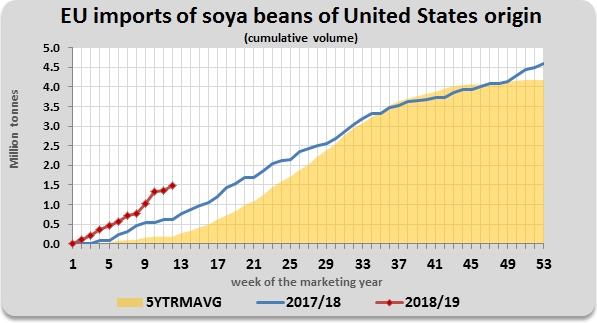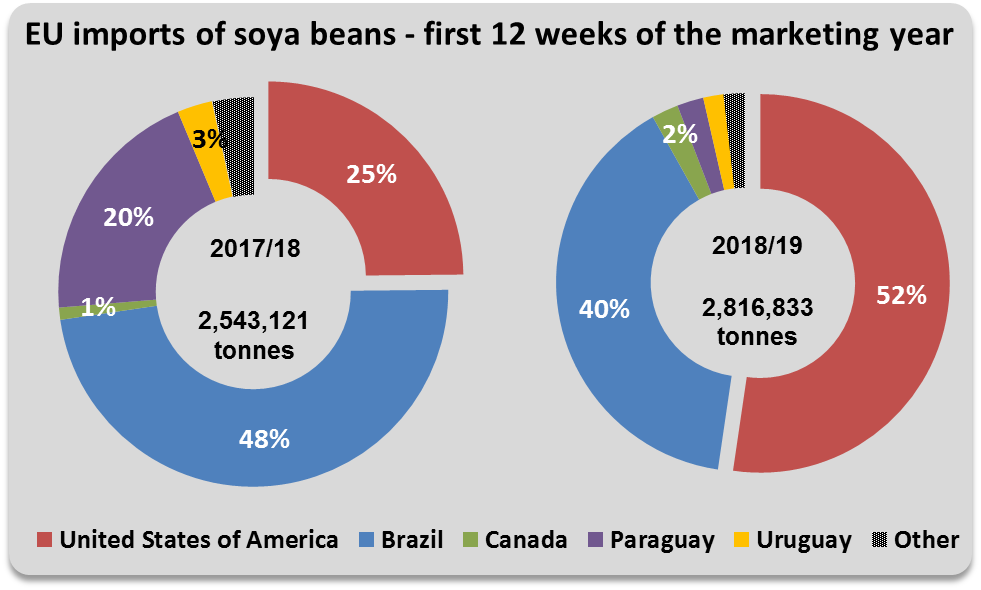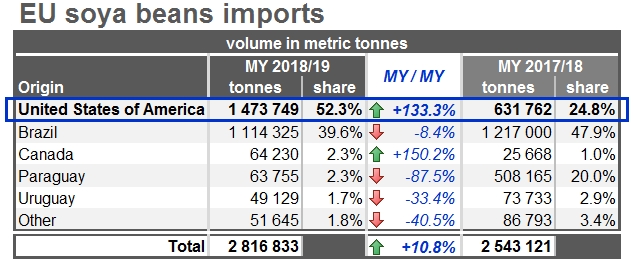One year on: EU-Canada trade agreement delivers positive results
Friday 21 September will mark the first anniversary of the provisional entry into force of the Comprehensive Economic and Trade Agreement (CETA) between the EU and Canada. Early signs show that the agreement is already starting to deliver for EU exporters. Commissioner for Trade Cecilia Malmström said: “The EU-Canada trade agreement has now been in action for a year and I’m pleased with the progress made so far. The preliminary data shows there is plenty to celebrate, even at this stage. Exports are up overall and many sectors have seen impressive increases. Our partnership with Canada is stronger than ever – strategically as well as economically. Together, we are standing up for an open and rules-based international trading order. CETA is a clear demonstration of that.” The latest statistics available, covering the October 2017 to June 2018 period, suggest that exports are up by over 7% year on year. EU exports benefiting the most include machinery, mechanical appliances and footwear that are up by over 8%; pharmaceuticals and furniture that are up by 10%, as well as cosmetics and clothing that are up by 11%. In terms of agri-food products, exports of fruit and nuts increased by 29%, chocolate by 34%, sparkling wine by 11% and whisky by 5%.Commissioner Malmström will visit Canada on 26 and 27 September to take stock of progress. Examples of companies that are already benefitting from CETA in various ways are available here. For more information see the full press release and a dedicated CETA website. (For more information: Daniel Rosario – Tel.: +32 229 56185; Kinga Malinowska – Tel: +32 229 51383)
U.S. is now the EU’s main supplier of soya beans with a share of 52%
Today the European Commission has published the latest figures on EU imports of soya beans, showing that the U.S. has become Europe’s main supplier of this commodity, reaching a 52% share compared to 25% in in the same period last year. Presidents Juncker and Trump issued a EU-U.S. Joint Statement following a meeting in Washington on 25 July, in which the two sides agreed to increase trade in several areas and products, notably soya beans. To monitor the evolution of trade in soya beans, President Juncker put in place a reporting mechanism according to which imports from the United States increased by 133% compared to the same period in the previous year (July-mid-September 2017). Commissioner for Agriculture, Phil Hogan, said: “I welcome the latest trade figures which show that we are delivering on the commitment made by Presidents Juncker and Trump to increase trade, particularly in relation to soya beans. This reflects both our longstanding trade relationship and the potential to achieve so much more by working together to build on that relationship.”The EU currently imports about 14 million tonnes of soya beans per year as a source of protein to feed our animals, including chicken, pigs and cattle, as well as for milk production. Soya beans from the US happen to be a very attractive feed option for European importers and users thanks to their competitive prices. A press release is available online. (For more information: Daniel Rosario – Tel.: + 32 229 56185; Clémence Robin – Tel.: +32 229 52509)
Commissioner Jourová met with tech companies to push for full compliance with EU consumer rules
Commissioner Jourová and national consumer authorities met with Airbnb and Facebook to take stock of the progress made on two ongoing consumer enforcement actions. Following the call from the European Commission and EU consumer authorities in July, Airbnb has now committed to making the necessary changes to their terms and conditions and improving the presentation of their prices. The company has until the end of 2018 to make these changes on all EU language versions of their website. Věra Jourová, European Commissioner for Justice, Consumers and Gender Equality, said: “The online players have revolutionised the way we travel, find accommodation and experience our holidays. But they also need to fully comply with the rules and take responsibility when things go bad. But EU consumers enjoy rights both off-line and online. I welcome Airbnb’s willingness to do the necessary changes to ensure full transparency and understanding of what consumers pay for. This action is part of a larger push for stronger protection of consumers online. That’s why we proposed reinforced consumer rules under the ‘New Deal for Consumers’ a few months ago.” Regarding Facebook, there was very limited progress in the framework of the ongoing enforcement action. Facebook’s new terms of services from April contain a misleading presentation of the main characteristics of Facebook’s services. In particular, Facebook now tells consumers that their data and content is used only to improve their overall “experience” and does not mention that the company uses these data for commercial purposes. Commissioner Jourová said: “My patience has reached its limit. While Facebook assured me to finally adapt any remaining misleading terms of services by December, this has been ongoing for too long. It is now time for action and no more promises. If the changes are not fully implemented by the end of the year, I call on consumer authorities to act swiftly and sanction the company.” A full press release on the Airbnb action is available online. Commissioner Jourová gave a press point on these topics this morning, which can be watched here. (For more information Christian Wigand– Tel.: +32 229 62253; Sara Soumillion – Tel.: +32 229 67094)
European Border and Coast Guard: Agreement reached on operational cooperation with Serbia
Today, Commissioner for Migration, Home Affairs and Citizenship Dimitris Avramopoulos and Nebojša Stefanović, Deputy Prime Minister and Minister of Interior of the Republic of Serbia, initialled a status agreement that will allow European Border and Coast Guard teams to be deployed in Serbia. The Agency will be able to assist Serbia in border management and carry out joint operations with Serbia, in particular in the event of a sudden change in migratory flows. Commissioner for Migration, Home Affairs and Citizenship Dimitris Avramopoulos said: “Today is another milestone in our cooperation with Serbia on migration, border management and security. I want to thank the Serbian authorities for their efforts, willingness and commitment to reach this agreement. Step by step, we are better protecting the EU’s external borders, and we are doing so also by cooperating more closely with partner countries in our direct neighbourhood and beyond. I look forward to finalising the agreement soon and hope to also swiftly conclude the ongoing negotiations with other Western Balkan partners.” Last week, following President Juncker‘s State of the Union Address 2018, the Commission proposed to further reinforce the European Border and Coast Guard, giving it the right level of ambition and allowing the joint operations and deployments to take place in countries beyond the EU’s immediate neighbourhood. Today’s status agreement with Serbia is the third agreement initialled with partner countries from the Western Balkan region, following Albania in February and the former Yugoslav Republic of Macedonia in July.A full press release is available online and the initialling of the status agreement can be followed on EBS. (For more information: Natasha Bertaud – Tel.: +32 229 67456 ; Katarzyna Kolanko – Tel.: +32 299 63444; Markus Lammert – Tel.: +32 229 58602)
E-commerce: Commission publishes new guidance for ending unjustified geo-blocking and making cross-border parcel delivery more affordable
Today, the Commission issued updated guidance for ending unjustified geo-blocking to help Member States and businesses active in the area of e-commerce to adapt to the new rules which start applying across the EU as of 3 December 2018. The rules against unjustified geo-blocking complement a number of other measures put forward by the Commission in 2016 to boost e-commerce in Europe (see factsheet). With these measures, the Commission wants to allow consumers and companies, to buy and sell products and services online more easily and confidently across the EU. Vice-President Ansip in charge of the Digital Single Market said: “Our initiatives will make it easier for people to shop online and for companies to reach new markets. To make the new rules work properly, all parties involved need to be fully informed and committed to applying them in their daily work. This guidance is part of the Commission’s broader efforts to boost e-commerce, through its proposals to simplify VAT rules, facilitate cross-border parcel delivery and payments, and strengthen consumer protection”. The new questions and answers on geo-blocking will help Member States to ensure a smooth start, by providing practical assistance to consumers, responsible authorities and traders. Today the Commission also delivers on its efforts to make parcel delivery across the EU more affordable. A new Regulation on cross-border parcel delivery services entered into force earlier this year (see press release and the MEMO)and the Commission now helps to ensure the proper roll-out of these new rules in the Member States. An implementing act adopted today specifies the information that parcel delivery service providers will have to hand in to national regulators. This will lead to increased transparency and improved regulatory oversight on the EU parcel market. Both documents are issued ahead of the meeting of European competitiveness ministers on 27 September, as they will also discuss the state of play of the Digital Single Market e-commerce initiatives.(For more information: Nathalie Vandystadt – Tel.: +32 229 67083; Lucía Caudet Tel.: +32 229 56182)
Increased prevention efforts needed to curb the growing risk of future wildfires
Today, the European Commission published its annual report on Forest Fires in Europe, the Middle East and North Africa for 2017.It shows the need to tackle climate change “to leave a healthier planet for those that follow”, as President Jean-Claude Juncker highlighted in his latest State of the Union Address and calls for stronger measures to prevent wildfires.Alone in Europe,last yearwildfires destroyed over 1.2 million hectares of forests and land – more than the total surface area of Cyprus. Karmenu Vella, Commissioner for Environment, said: “Extreme weather conditions exacerbate wildfires and make firefighting more difficult. We need to invest much more in forest management to ensure best practice throughout the EU. As the summer of 2018 has shown us again, much work is needed on prevention and Europe must remain at the forefront in the fight against climate change.” Tibor Navracsics, Commissioner for Education, Culture, Youth and Sport, responsible for the Joint Research Centre (JRC), said: “JRC scientists are continuously monitoring wildfires in Europe through the European Forest Fire Information System. This helps us better understand the changes and provides a basis for national authorities to improve both prevention and firefighting preparedness.” The report drawn up by the JRC based on data provided by the EU, EU Member States and neighbouring countries gives a detailed analysis of the wildfires in 2017, including country-specific reports. A press release is available online. (For more information: Nathalie Vandystadt – Tel.: +32 229 67083; Enrico Brivio – Tel.: +32 229 56172)
State aid: Commission finds Italy granted incompatible aid to Naples port authority but no aid involved in delayed collection of concession fees by port authority
The European Commission has assessed under EU State aid rules several measures concerning the Port of Naples, and has today adopted two separate State aid decisions in this regard. First, the Commission has found that Italy’s grants of €44 million to the Naples port authority to refurbish dry-docks rented out to Cantieri del Mediterraneo (CAMED) were in breach of EU State aid rules, as they gave both the Port Authority of Naples and CAMED an unfair economic advantage over their competitors. The Commission also examined whether the aid could be found compatible with State aid rules, which allow Member States to support certain economic activities under specific conditions, but found that the measures failed to meet the relevant criteria. Second, the Commission investigated certain delays in the collection of concession fees by the Naples port authority from certain concessionaires (e.g. ship repairers, terminal operators and transport companies) but found that these delays did not constitute State aid. A full press release is available in EN, DE, FR and IT (For more information: Lucia Caudet Tel – +32 2 295 61 82); Giulia Astuti – Tel: +32 229 55344)
Concentrations : la Commission renvoie l’examen de l’acquisition de Bernard Participations par PGA Motors et Fiber à l’autorité française de la concurrence
La Commission européenne a décidé, en vertu du règlement européen sur les concentrations, d’accepter le renvoi à l’autorité française de la concurrence de la totalité de l’examen du projet d’acquisition de la société Bernard Participations SAS par les sociétés PGA Motors SAS (filiale du groupe Emil Frey) et Fiber SC, toutes trois basées en France. Bernard Participations et PGA Motors sont principalement actives dans la distribution au détail de véhicules automobiles neufs et d’occasion et de pièces détachées, ainsi que dans la fourniture des services de réparation et d’entretien connexes. À titre accessoire, elles sont également actives dans la location de véhicules et la distribution de produits d’assurance. Fiber est une société holding familiale détenant une participation de contrôle dans Bernard Participations. La Commission a conclu que la concentration envisagée était susceptible de soulever des problèmes de concurrence sur des marchés distincts situés exclusivement en France, et que l’autorité française de la concurrence était la mieux placée pour examiner l’opération. De plus amples informations sont disponibles sur le site internet concurrence de la Commission, dans le registre public des affaires sous le numéro d’affaire M.8966. (Pour plus d’informations: Lucía Caudet – Tel. +32 229 56182; Maria Tsoni – Tel.: +32 229 90526)
ANNOUNCEMENTS
Federica Mogherini travels to Montreal to co-host women Foreign Ministers meeting with Canada’s Chrystia Freeland
On 21-22 September, High Representative/Vice-President Federica Mogherini will co-host, with Foreign Minister Chrystia Freeland, a global meeting of women Foreign Ministers. The discussions between the women Foreign Ministers, taking place in Montreal, will focus on strengthening democracy and advancing global peace, security and prosperity – which include ensuring women’s rights, from equal participation to freedom from violence. The Foreign Ministers will also exchange with experts and civil society organisations.The European Union and Canada share a strong commitment to promoting gender equality and women’s rights, and more broadly to the values of democracy, equality and multilateral cooperation to advance global peace, security and prosperity.This initiative by High Representative Mogherini and Minister Freeland seeks to complement ongoing and multilateral efforts to advance these shared values, bringing together women Foreign Ministers from around the world to reflect on and identify areas where cooperation could bring about change. Audio-visual coverage of the event will be provided by EbS. (For more information: Maja Kocijancic – Tel.: +32 229 86570; Adam Kaznowski – Tel: +32 229 89359)
Vice President Katainen in Paris to co-chair the Global Forum on Steel Excess Capacity
European Commission Vice-President Jyrki Katainen, responsible for Jobs, Growth, Investment and Competitiveness, will be in Paris, France, today to co-chair the Ministerial Meeting of the Global Forum on Steel Excess Capacity. The meeting aims to confirm and implement recommendations of the previous Ministerial Meeting having taken place in Berlin in November 2017. The problem of steel overcapacity continues to have the highest political and economic significance. It drives prices down to unsustainable levels, and has had a real impact on the steel industry and people who work in it. It has also strained global trade relations. While recognising the large efforts to reduce overcapacity, in particular in China, the EU wants to see more and accelerated efforts to reduce excess capacity wherever necessary, and subsidies which cause overcapacity to be eliminated within a clear timeline. The Global Forum on Steel Excess Capacity was established in December 2016 following a G20 recommendation, to develop principles guiding governments towards concrete policy solutions to reduce steel excess capacity. The Forum brings together 33 member economies representing more than 90% of global steel production and capacity. The OECD acts as the facilitator to the Global Forum, its Steering Group and the Chairmanship, currently held by Argentina. (For more information: Daniel Rosario – Tel.: +32 229 56185; Kinga Malinowska – Tel: +32 229 51383)
Commissioner Stylianides in Greece
Today Commissioner for Humanitarian Aid and Crisis Management Christos Stylianides attends the 20th Insurance& Reinsurance Meeting organised by the Union of Insurance Companies of Greece. Commissioner Stylianides willdeliver a keynote speech on the Commission’srescEU proposal which aims to strengthen European capacities to deal with disasters, such as floods, forest fires, earthquakes and epidemics. (For more information: Carlos Martin Ruiz de Gordejuela – Tel.: +32 229 65322; Daniel Puglisi – Tel.: +32 229 69140)
Commissioner Jourová on official visit to Cyprus
Commissioner Jourová will be in Nicosia tomorrow, where she will meet M. Nicolaou, the Minister of Justice and M. Petrides, the Minister of Interior, with whom she will discuss the Cypriot citizenship programme and the implementation of EU anti-money laundering rules. They will exchange views on the reform of the justice system- a topic she will also discuss with the President of the Supreme Court, M. Nicolatos. In the afternoon, she will further discuss anti-money laundering topics with the Cyprus Financial Intelligence Unit and Central Bank. She will then participate in a roundtable on equality, including gender and LGBTI, with representatives from businesses, the government and NGOs. Finally, she will host a Citizens’ Dialogue on the Future of Europe regarding to justice, consumers and gender equality at the University of Cyprus, which will be live from 15:30-17:00 CET. A joint press point is planned with the Minister of Justice at 12:15. (For more information Christian Wigand– Tel.: +32 229 62253; Melanie Voin – Tel.: +32 229 58659)
Upcoming events of the European Commission (ex-Top News)



